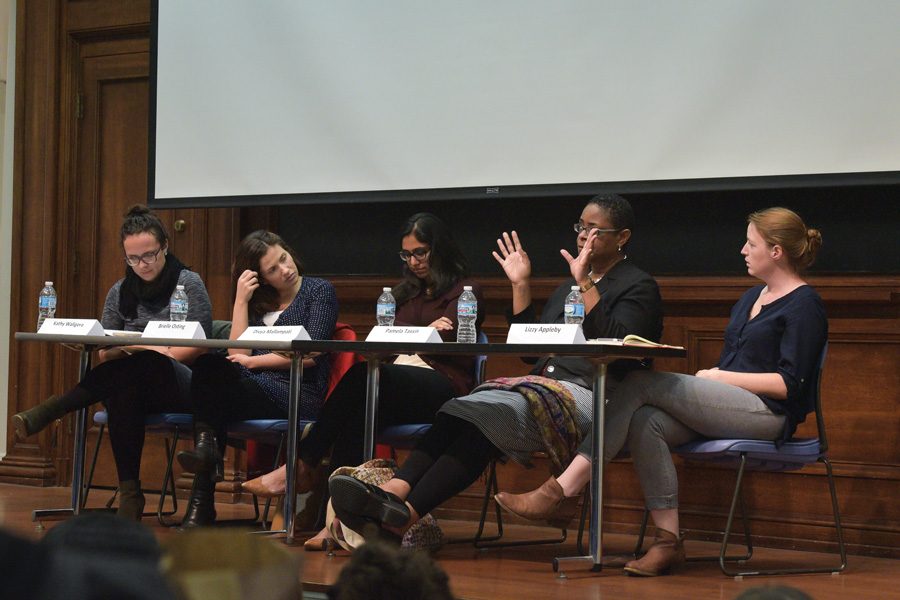iGEM panelists discuss reproductive justice with an intersectional lens
Leah Dunlevy/The Daily Northwestern
Panelists speak about class, race and identity in reproductive justice. The panel was hosted by iGEM at Harris Hall on Thursday night.
October 21, 2016
Issues surrounding the accessibility of reproductive health care include socioeconomic factors that go beyond just contraception, panelists said Thursday night.
The event featured five panelists who spoke about global reproductive justice to about 60 students in Harris Hall. Northwestern’s International Gender Equality Movement partnered with various student organizations to host the panel, which addressed topics such as healthcare, HIV and sexual education.
Panelist Divya Mallampati spoke about the “gross inequities” in reproductive health care that she observes as an OB-GYN resident at Northwestern’s McGaw Medical Center. She said sexual health services are some of the hardest resources to access, especially in disadvantaged communities.
Mallampati made an example of NU’s delivery rooms compared to those in area hospitals. She said the University’s facilities “look like hotels,” and numerous doctors are available to provide immediate assistance when needed.
In contrast, help often takes significantly longer at other hospitals in other areas of Cook County, she said.
“These differences aren’t just descriptive differences; they’re inequities and differences of justice,” Mallampati said.
Kathy Waligora and Brielle Osting represented EverThrive Illinois — an organization that educates and advocates for women, children and families — at the panel and said reproductive justice is an issue of race, class and gender.
“We try to look at everything from a racial equity perspective,” said Osting, the organization’s manager of maternal and infant mortality initiative. “If you’re a white clinician, you have to be comfortable talking about race, acknowledging your own privilege and be willing to engage in those uncomfortable conversations.”
Waligora, EverThrive’s director of health reform initiative, said Illinois legislators have been looking to build on the Affordable Care Act in order to improve access to contraception through health insurance.
EverThrive supported a bill that passed last spring to ensure more birth control products are covered under insurance, including sterilization for men, Waligora said. The legislation is intentionally gender neutral, she said, in an effort to be as inclusive as possible.
All of the panelists at the event encouraged NU students to advocate for the importance of reproductive justice. One way to do so is to vote in the upcoming election, Osting said.
“Don’t be afraid to talk to people in power and make them hear you,” she said. “They work for you.”
Weinberg senior Sanjana Lakshmi, iGEM’s co-president, said the club decided to host the panel to bring different student groups together with professionals in the field of reproductive health and justice.
Arielle Ticho, the co-president of the NU’s chapter of iGEM, said the panel was meant to remind NU students that these issues exist in the Chicago and Evanston communities.
“All of this work is so intersectional,” the SESP senior said. “It’s important to bring it to the forefront that access to reproductive healthcare is an issue that touches so many different aspects of people’s identities.”
Email: [email protected]
Twitter: @SydStone16


